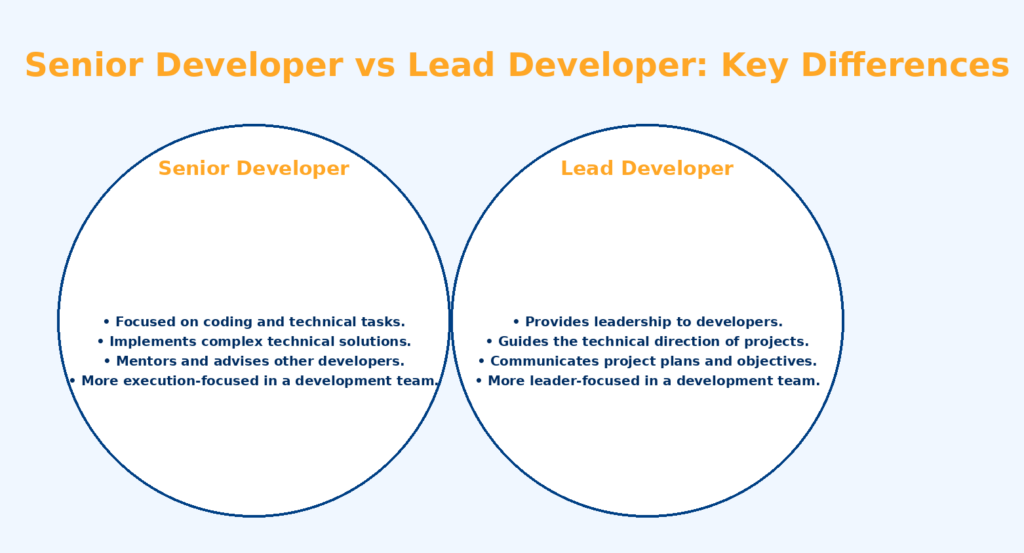When it comes to job titles, the position of lead software developer is a step up from senior software developer. While a senior software developer is an individual contributor who is measured by their ability to build well-architected features, fix tough bugs, and mentor junior developers, a lead developer is still expected to code, although they are handed the delivery for an entire work‑stream, balancing hands‑on design reviews with backlog grooming, stakeholder meetings, staffing, and ultimately project success.
In fact, we can see this through economic data, as the median salary for a lead developer in the U.S. is $180,000 (Glassdoor), while a senior developer makes about $145,000. Both are roles whose demand in the U.S. are growing rapidly, as can be seen by a 17% growth projection in the U.S. job market over the next 10 years.
Here’s a deeper look into how a senior developer vs lead developer differs, the key responsibilities of each role, and other factors that are important to distinguish when it comes to these roles.
| Difference | Senior SWE | Lead SWE |
|---|---|---|
| Primary scope | Owns major features/modules | Owns whole product area or program |
| Hands‑on coding | 60‑80 % of time | 30‑50 % of time |
| People leadership | Mentors; no formal reports | Often 2‑10 direct reports |
| Decision latitude | Technical decisions inside the codebase | Technical and resourcing decisions; signs off on estimates |
| Stakeholder exposure | Team & Staff engineers | Engineering director, product, sometimes C‑suite |
| Typical pay (US, 2024) | $145 k median | $180 k median |
| Career next step | Lead or Staff Engineer | Engineering Manager or Principal Engineer |
What is a Senior Developer?
A senior developer is a software professional with five or more years of expertise in programming languages, frameworks, and software architecture. Senior developers can design solutions and solve difficult technical problems with little to no supervision.
What does a Senior Software Engineer do?
- Drive best practices—testing, CI/CD, observability—and mentor mid‑level developers through pair‑programming and design walkthroughs
- Serve as the technical authority for one or more components, drafting designs, guiding code reviews, and proactively resolving production incidents
Typical duties and expectations for senior developers include:
- Technical Leadership and Problem-Solving
- Mentoring and Knowledge-Sharing
- Conducting code reviews
- Communicating with project leaders, stakeholders, and non-technical team members
- Working to ensure technical decisions align with business goals and timelines
- Coding and Implementation
- Producing and reviewing code
- Reporting and Accountability
By combining exceptional technical abilities with leadership, communication, and mentoring skills, senior developers make a substantial contribution to their teams. They affect the short-term success of projects as well as the longer-term technical direction of the company as a whole.
What is a Lead Developer?
A lead software engineer is both a technologist and a team leader. This person supervises the overall engineering effort of a development project and acts as a point person.
Because they’re mostly seasoned experts and have the years of experience and skill that render them qualified to lead teams and communicate more consistently with those outside of the IT department, they normally concentrate on the business side of technology projects.
What does a Lead Software Engineer do?
Most leads still contribute code—especially on critical paths—but they deliberately drop below 50 % coding time so they can unblock others and keep the delivery pipeline healthy
- Owns the end‑to‑end technical direction for a product area, translating product OKRs into technical road‑maps and sprint goals
- Interfaces with product, design, security, and often executives to balance scope, risk, and release dates
- Coaches seniors and mids, conducts performance reviews, and shapes hiring/retention plans
Lead developer responsibilities often include:
- Project planning and coordination
- Designing the technical architecture of software projects
- Allocate tasks to team members based on their skills and expertise
- Involve in client or stakeholder meetings providing technical insights
- Identifying potential risks in projects and taking proactive measures to mitigate them
- Monitor the performance of software and identify bottlenecks
- Project documentation
Senior Developer vs. Lead Developer: Key Differences

A senior developer and a lead developer have different roles within the development process. Both must be highly skilled in their field, but the two positions have very different responsibilities:
1. Responsibility and Decision-Making
A key difference between a lead vs senior developer lies in the scope and level of responsibility they carry in a development project or team. A lead programmer has a higher level of accountability and decision-making authority than senior developers.
Lead developers are accountable for project planning, technical direction, and ensuring that the projects they take charge of succeed. Senior developers, on the other hand, typically focus on individual tasks and technical expertise.
Additionally, while both roles assist developers in their teams and provide guidance, lead developers focus more on the management and business operation aspects. They often communicate with clients and business leaders to understand project requirements.
Senior developers take the role of “team leaders,” providing mentorship and working within their teams to help complete the project.
2. Skills
Both roles require an in-depth level of expertise and understanding of software development and its best practices. However, the difference between a senior developer vs tech lead in terms of skills lies in the fact that tech leads take more of the operational and business aspect of project management, while a senior developer is more technical and focused on programming.
Common skills for senior developers are:
- Deep language or domain expertise (e.g., Java micro‑services or iOS performance tuning)
- Advanced debugging, refactoring, and performance‑optimization chops
- Soft‑skill must‑haves include technical writing, constructive feedback, and cross‑team communication
Lead developers have skills such as:
- Technical leadership setting standards and making critical project decisions
- Sales
- Project management skills, including planning, coordinating and ensuring milestones are met.
- Team coordination
- Communication skills
- Strategic thinking
- Conflict resolution
- Risk management
3. Project Management
Lead developers are actively involved in project management, from planning and coordination to ensuring that project milestones are met. They take an active leadership role that focuses more on overseeing the project’s development.
On the other hand, senior developers concentrate more on the technical execution of the project – they do not have the same level of involvement in project management as lead developers.
These are the main project management responsibilities both roles have:
| Lead Developer | Senior developer |
| Project Planning | Technical Execution |
| Task Allocation | Code Reviews |
| Coordinating the Development Team | Mentorship and Assistance |
| Risk Management | Meeting Technical Requirements |
| Tracking Project Progress | Task Completion |
| Client/Stakeholder Communication |
4. Job Duties
A senior developer has technical skill as their main area of expertise, with all of their core job functions revolving around coding and technical tasks, as well as advising and mentoring other developers. Work like implementing complex technical solutions and developing processes are mostly the domain of senior developers.
To put it simply, senior developers are more execution-focused in a development team.
A lead developer’s core responsibilities encompass more than just technical talent. Lead developers have greater responsibilities than simply writing quality code. They provide leadership to developers and “set the tone” for the technical direction of the project as well as for maintaining coding best practices and standards.
Lead developers facilitate processes like project planning and serve as a liaison between technical and non-technical stakeholders. This means they need to communicate with key people in an organization about project plans, roadmaps, and team objectives. They must also need to communicate with non-technical team members to ensure that they understand the business goals and requirements of the project.
To put it simply, lead developers are more leader-focused in a development team.
5. Salaries
When it comes to tech lead vs senior engineer salary, the first ones typically earn a higher income than senior developers due to increased responsibilities and leadership roles.
The average salary for a senior developer based in the United States ranges from $90,000 to $140,000 per year. On the other hand, the lead developer’s salary in the United States is around $100,000 to $160,000 per year, according to data from Glassdoor, Indeed, PayScale, and general BLS stats. However, keep in mind this figure can vary depending on the level of expertise, certifications, and demand.
Another key factor in terms of salary is location. Developers based in popular offshoring regions, such as Eastern or Latin America, charge lower salaries due to their cost of living.
Hiring remotely becomes a cost-effective strategy for those companies looking for upper-level IT roles without sacrificing quality.
Here’s a table with the average salaries of both roles in different countries:
| Country | Average Lead Developer annual salary | Average Senior Developer annual salary |
| Canada | $85,000 – $140,000 | $75,000 – $120,000 |
| Mexico | $30,000 – $60,000 | $25,000 – $45,000 |
| Colombia | $25,000 – $60,000 | $18,000 – $40,000 |
| The Philippines | $25,000 – $45,000 | $20,000 – $35,000 |
| Poland | $30,000 – $65,000 | $15,000 – $40,000 |
| Ukraine | $30,000 – $65,000 | $18,000 – $35,000 |
| Germany | $70,000 – $120,000 | $60,000 – $100,000 |
6. Project Planning and Technical Leadership
Senior Developers have limited involvement in project planning and are mostly consulted for technical advice. They may weigh in on aspects of a project related to development, such as the technical feasibility of a specific feature or function. They are also sometimes asked to give feedback about the technology stack or any anticipated development challenges. However, these developers do not spend the majority of their time focusing on project planning.
On the other hand, project planning is one of the key responsibilities of a lead developer. Project planning consists of many of the processes required to ensure software development project success.
After understanding the technical requirements of a project, Lead Developers try to figure out if the project is technically feasible. They identify any challenges that might arise and any constraints introduced by the tools and technologies needed to meet the requirements. They also identify the tools and technologies needed to meet the requirements.
Therefore, while senior developers have great technical skills and can contribute greatly to a project individually, lead developers are expected to provide technical leadership and work more closely with a team.
7. Overall Scope of Influence
Senior developers have a more narrow scope of influence. Because they focus mainly on technical skill, they have slightly less impact. Developers in senior positions are crucial to the successful implementation of specific tasks, and they are tasked with providing excellent delivery of code and other technical solutions. They also have a significant impact on less experienced developers by sharing their knowledge and offering mentorship. However, the overall impact of a senior developer is less than that of a lead developer.
Lead developers have a much broader scope of influence. This is because they are responsible for a variety of tasks beyond simply producing code. They oversee project management and team organization and communication; they also serve as the go-to person for various technical processes. They therefore have a disproportionate impact on the success of a project and the functioning of the entire team.
Conclusion
As discussed, the main difference between senior developers and lead developers is in terms of leadership. If your team needs a leader who guides the IT department within the projects helping design and coordinating with other departments, then a lead developer is the right match for you.
But if the role you’re seeking is more in terms of execution and focused on programming, you can look for a senior developer. They can provide mentorship and technical support, but their primary responsibility relies on coding.
If you’re still unsure of your business needs and want to know more in-depth about both roles and their impact on organizations, we can help you.
Experience a hassle-free hiring process with DistantJob. From defining job requirements to finalizing paperwork, we take care of everything. We charge no initial fees—you only pay when you hire. Plus, we handle contract management and payments, allowing you to focus on your core business.
FAQ
Yes, the role of a lead developer is typically higher than that of a senior developer. Lead developers have broader responsibilities, including project management, team coordination, and technical leadership, whereas senior developers primarily focus on technical execution and expertise.
The main difference between a lead developer and a senior developer lies in their roles and responsibilities. Lead developers take on leadership and management duties while, senior developers primarily focus on technical execution and may mentor junior team members, but they do not have the same level of involvement in project management as lead developers.
Junior managers are at the early stages of their management careers, typically with limited experience and smaller team/project responsibilities. Senior managers have more extensive experience, oversee larger and more complex projects/teams, and play a vital role in strategic planning and decision-making. Lead managers are at the highest level of management, overseeing multiple teams or departments, and provide leadership and direction to other managers while actively contributing to shaping the organization’s overall direction and vision.





